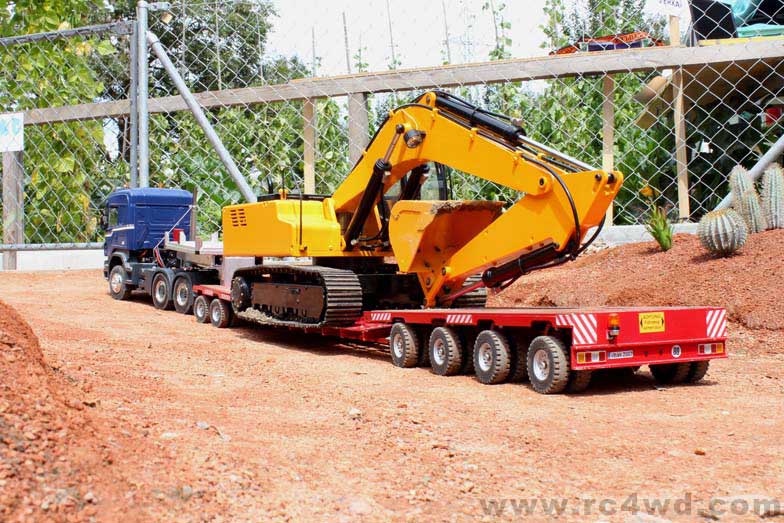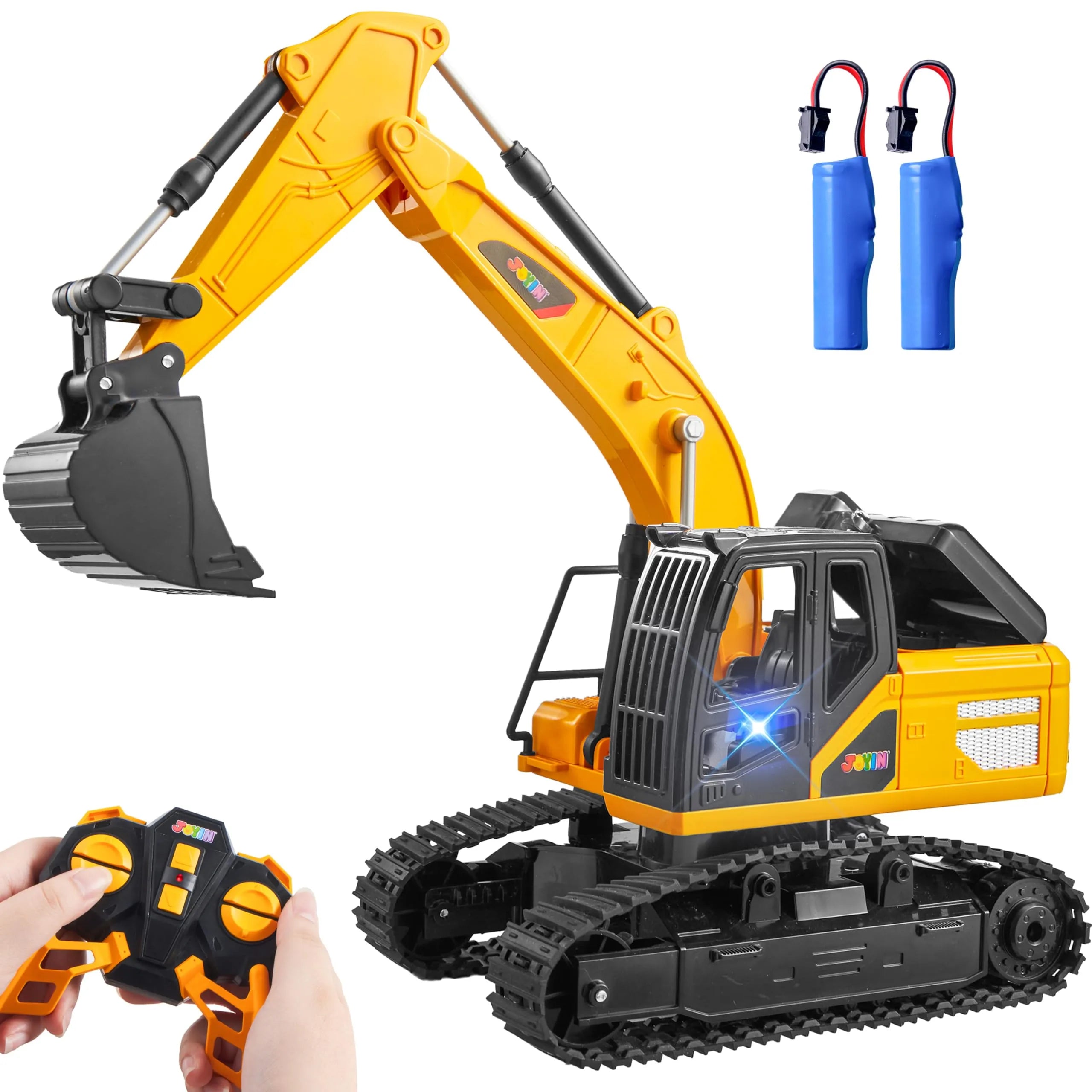What Makes the rc excavator Stand Out Among Other Construction Machines
Wiki Article
Discover the Significance of Excavator in Modern Building Projects
Excavators are necessary tools in modern construction jobs. Their convenience permits them to carry out a wide range of jobs, from excavating and grading to demolition and website prep work. Advanced attributes, such as hydraulic add-ons and general practitioners, boost their abilities and performance on job sites. As the industry develops, the relevance of excavators grows a lot more. Recognizing their duty can disclose understandings into the future of building practices. What exists in advance for these makers?The Adaptability of Excavators in Different Projects
Although excavators are often related to large-scale building projects, their flexibility allows them to be used in a vast array of applications, from residential landscaping to energy upkeep. In metropolitan setups, excavators can browse tight areas to dig structures for homes or mount water drainage systems. Their capacity to carry out delicate tasks makes them perfect for landscape design tasks, where they can dig deep into for fish ponds or plant trees. In enhancement, excavators play an important role in energy maintenance, successfully excavating trenches for pipes or cable televisions without interfering with surrounding areas. In agricultural applications, they assist in land clearing and dirt preparation. Moreover, their flexibility allows them to be equipped with different accessories, boosting their functionality throughout different jobs. This multifaceted nature of excavators not just simplifies numerous building and construction processes yet likewise demonstrates their integral duty in contemporary infrastructure advancement and maintenance.Secret Features and Types of Excavators
The conversation on crucial attributes and sorts of excavators highlights the necessary characteristics that make these machines vital in construction. Numerous excavator kinds, each created for particular jobs, demonstrate their versatility and performance across different applications. rc excavator. Comprehending these classifications and attributes is vital for enhancing their usage in modern-day building tasksExcavator Types Summary
Excavators play a crucial role in contemporary construction, providing adaptability and efficiency across different jobs. These hefty machinery devices been available in numerous kinds, each customized for specific applications. One of the most usual types include crawler excavators, known for their security on irregular terrain, and wheeled excavators, which offer greater wheelchair on smooth surface areas. Miniature excavators are preferred for limited rooms and small projects, while long-reach excavators are developed for deep digging. Furthermore, there are customized excavators, such as hydraulic excavators, which boost power and accuracy. Each type features unique capabilities, making them vital for tasks ranging from excavating and grading to demolition and material handling. Understanding these variations enables building and construction professionals to pick the best excavator for their task needs.Key Includes Explained
Understanding the essential functions of excavators improves their reliable application in construction tasks. Excavators are defined by their effective hydraulic systems, which offer the necessary force for digging, lifting, and relocating materials. Their articulated arms permit a large range of motion, helping with specific operations in constrained spaces. In addition, the variety of accessories, such as pails, grapples, and augers, increases their convenience to fulfill different task demands. The dimension and weight of excavators additionally add to their stability and maneuverability on numerous terrains. Improvements in modern technology have led to the combination of GPS and automation, enhancing precision and efficiency in excavation tasks. These features jointly place excavators as essential tools in modern building.Applications in Building
Transforming building sites, excavators play an essential role across various applications, varying from property structure projects to massive infrastructure developments. These versatile makers are equipped for tasks such as digging foundations, trenching for energies, and site grading. Various types of excavators, consisting of crawler, rolled, and mini excavators, supply certain advantages customized to the task requirements. Spider excavators succeed in rough terrains, while wheeled excavators use flexibility on paved surface areas. Mini excavators are optimal for restricted rooms, making them prominent in metropolitan settings. The efficiency and power of excavators substantially quicken construction processes, making certain timely job conclusion. Their flexibility even more enhances their significance, permitting building and construction groups to deal with a varied array of obstacles properly.Enhancing Effectiveness and Efficiency on Work Sites
Maximizing performance and performance on work sites is a crucial purpose in modern building. Excavators play a pivotal function in attaining this goal by enhancing different jobs. Their capacity to do multiple functions-- such as training, digging, and grading-- reduces the need for extra devices, thus conserving time and resources.Moreover, excavators improve process by enabling for faster completion of projects. With advanced attributes like hydraulic add-ons and GPS modern technology, they can carry out specific procedures that decrease errors and rework. This precision not just boosts the quality of job however also maximizes product usage, adding to cost savings.The flexibility of excavators permits them to adjust to different site conditions, ensuring that tasks advance efficiently no matter of difficulties. By integrating excavators into useful site construction processes, teams can greatly boost their general performance, leading to prompt job conclusion and increased earnings.Security Advantages of Making Use Of Excavators
Excavators significantly enhance security on construction sites through boosted driver exposure and reduced hand-operated labor dangers. By offering operators with a clear sight of their environments, excavators aid to avoid mishaps and injuries. Additionally, the equipment minimizes the requirement for employees to participate in hazardous hands-on jobs, further promoting a more secure workplace.Improved Operator Exposure
Building websites can be chaotic and filled up with possible threats, improved operator visibility plays an essential function in making certain security when using excavators. Modern excavators are made with big, unblocked home windows and tactically put mirrors, enabling operators to keep a clear sight of their environments (rc excavator). This improved presence is vital for detecting pedestrians, other equipment, and various barriers, significantly reducing the threat of accidents. Furthermore, lots of excavators integrate advanced technology, such as video cameras and sensors, to supply drivers with added perspectives, better boosting awareness. The capacity to see even more clearly not only help in efficient procedure however also fosters a much safer work setting, making it easier for operators to navigate complicated construction websites without jeopardizing safety and security requirementsReduced Manual Labor Risks
When manual work is minimized through making use of excavators, countless safety benefits emerge, substantially enhancing the wellness of building employees. Excavators reduce the physical stress related to heavy training and repeated jobs, effectively decreasing the risk of bone and joint injuries. By automating processes such as excavating, grading, and relocating products, they permit employees to keep a safer distance from potential threats. Furthermore, excavators are furnished with innovative security attributes, such as rollover protection systems and improved operator comfort designs, which better guard workers on site. The result is a significant decrease in work environment crashes and injuries, resulting in raised performance and morale amongst building and construction groups. Inevitably, the adoption of excavators adds to a more secure and a lot more reliable construction environment.Excavators in Earthmoving and Site Preparation
In modern building and construction, a substantial part of earthmoving and site prep work jobs relies upon the performance and convenience of excavators. These devices are developed to manage different dirt types and surface, making them indispensable for grading, excavating, and trenching tasks. Their hydraulic arms can be furnished with different add-ons, such as augers and containers, allowing operators to personalize their method based upon details project requirements.Excavators excel at moving big quantities of earth swiftly and successfully, which increases the total construction timeline. They can navigate limited areas and challenging websites where conventional tools may have a hard time, enhancing efficiency. Furthermore, the precision of excavators assurances that site prep work complies with rigorous specs, minimizing the danger of errors that can result in pricey rework.The Function of Excavators in Demolition Tasks
Excavators play a vital function in demolition jobs, as they possess the power and dexterity needed to take down frameworks efficiently. Furnished with various attachments such as hydraulic breakers, shears, and grapples, these devices can adapt to different demolition requirements, whether for tiny structures or huge commercial websites. Their versatility makes it possible for operators to tackle intricate jobs while preserving safety and security and precision.In enhancement to their demolition abilities, excavators promote debris elimination, ensuring that job websites remain organized and safe. By damaging down frameworks right into workable pieces, they enable for structured cleaning and recycling of materials, aligning with contemporary sustainability efforts.Moreover, excavators can access limited spaces and navigate irregular surface, making them vital in metropolitan demolition projects. In general, their durable design and multifunctionality make excavators an essential possession in the demolition stage of building and construction, contributing substantially to job timelines and efficiency.

Future Patterns in Excavator Technology and Use
As the building market evolves, developments in excavator modern technology are poised to transform their usage and efficiency noticeably. One significant trend is the combination of automation and fabricated knowledge, enabling excavators to operate with very little human intervention. This change will visit this page boost accuracy in tasks such as grading and trenching, decreasing human mistake and boosting productivity.Additionally, the rise of electrical and hybrid excavators is forming a more sustainable construction environment, lowering carbon discharges and gas expenses. Improved telematics systems check my reference are also arising, making it possible for real-time monitoring of device efficiency and upkeep requirements, which can bring about better operational performance and longer devices lifespan.Moreover, innovations in attachment technology are expanding the flexibility of excavators, permitting them to perform a wider variety of jobs. The mix of these trends demonstrates a future where excavators are smarter, greener, and extra adaptable, eventually improving construction job dynamics.
Often Asked Questions
How Do Excavators Compare to Various Other Building Equipment?
Excavators, characterized by their adaptability and power, master excavating and earthmoving contrasted to other machinery. Their capability to do various tasks, consisting of training and demolition, makes them indispensable in building and construction projects, boosting overall effectiveness.
What Is the Ordinary Life Expectancy of an Excavator?
The average life expectancy of an excavator typically ranges from 7,000 to 10,000 operating hours, depending on upkeep, use problems, and model. Correct treatment can expand this life expectancy, making certain peak efficiency throughout its functional years.How Are Excavators Maintained for Optimal Performance?
Excavators call for routine maintenance for peak efficiency, including routine examinations, liquid checks, filter replacements, and timely repairs. Carrying out a precautionary upkeep schedule aids lengthen their life expectancy and warranties effective operation in various building settings.What Are the Prices Connected With Leasing vs. Acquiring an Excavator?
The prices connected with renting out versus acquiring an excavator differ significantly. Leasing offers reduced upfront expenses but can gather over time, while purchasing needs a substantial first investment, however supplies lasting cost savings and property possession benefits.What Training Is Called For to Run an Excavator?
Operating an excavator needs specialized training, usually including safety protocols, maker procedure techniques, and ecological recognition. Accreditation programs usually mandate useful experience, allowing operators to manage various jobs efficiently while making certain compliance with sector regulations. The most usual types consist of crawler excavators, understood for their stability on unequal terrain, and wheeled excavators, which give greater flexibility on smooth surface areas. Mini excavators are favored for tight rooms and small-scale tasks, while long-reach excavators are designed for deep digging. Furthermore, there are specific excavators, such as hydraulic excavators, which improve power and accuracy. Different types of excavators, including spider, rolled, and mini excavators, offer specific advantages tailored to the task demands. Spider excavators succeed in rough surfaces, while rolled excavators offer movement on smooth surface areas.Report this wiki page